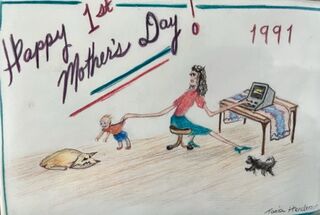Parenting
Happy Mother's Day to Solo Moms (of Donor Kids)
Personal Perspective: A special shout-out to single mother (only) parents.
Posted May 5, 2022 Reviewed by Kaja Perina
Key points
- The only-parent experience is frequently quite different from a single parent experience.
- Sperm banks sell around 50% of their sperm to solo single women.
- Solo parenting is 24/7 and 365 days a year.
- There are some positives to being an only parent.
"Three whole days?"
Recently, I was watching a tv show where the mom of a toddler was in tears because her husband had just left that day for a week-long business trip. She did not know how she was going to cope as an only parent, even for a few days.
It made me remember when my son was about 10-years-old, a co-worker came into work on a Monday morning looking exhausted and disheveled. She explained that her husband has been out of town since Friday and that she alone had been taking care of their 2-year-old ..… for three whole days! I remember thinking, I’ve been taking care of my child all by myself ..... for ten whole years.
Many of my friends were single moms, but they had ex-spouses that would regularly take the child(ren). I think that unless you’ve done it alone, you have no idea what being an only parent entails. There is no regular Tuesday and Thursday evening or weekend hiatus or bi-weekly time to regroup. Some of us are lucky enough to have parents or other relatives close by for support and for the occasional night off, but many are not that fortunate.
Learning to do it all
Around 50% of all purchased sperm goes to single mothers1. While I do wish all moms a happy Mother's Day today, I'm sending a special shout-out and acknowledgment to those who are successfully raising their kids all by themselves and who are figuring out how to do pretty much anything and everything.
A couple of challenges came to mind when I thought about my own journey:
- Making great efforts to find positive male role models: friends, teachers, mentors, tutors, and a Big Brother.
- Making many extremely difficult financial and academic decisions for a profoundly gifted child.
I then asked Donor Sibling Registry solo moms of donor-conceived children what were some things they had to figure out how to do while on 24/7 kid duty? I could relate to it all:
- Anything that you want/need to do alone takes extra planning, money, help or all of the above. Planning for any and all appointments like doctors, dentists, and hair, while still trying to work takes a huge amount of organizational skills.
- Figuring out how to date when family is far away and childcare is pricey.
- Trying to explain to a 2-year-old why he doesn't have a daddy when his vocabulary is still very limited.
- Managing the household finances, bills, caregivers, kids, and your own schedule.
- Dividing time when there are conflicting needs. Who watches the other kids if one of them or you are ill or incapacitated?
- Dealing with the unspoken disapproval of others.
- Planning coverage for every single half-day/school closing while working full time.
- If you’re cooking and run out of an ingredient, you can’t go get it. Same for needing medication.
- Carrying shopping items inside from the car alone, as either the child is alone inside the home or car at some point.
- Dealing with your own grief process while solo parenting can be extremely challenging.
- Figuring out how to be two independent people and not codependent.
- After childbirth, going back to work FT after 2 or 4 weeks.
Some positives to being an only parent:
- The freedom to make household and financial decisions independently.
- No disagreement on parenting styles. No need to negotiate parenting choices with a partner.
- No need to negotiate the sharing of duties with a partner.
- No being disappointed by a co-parent.
- Receiving 100% of the credit for your great kid(s).*
*You also own 100% of the parenting mistakes.

References
1. Reproductive BioMedicine Online. A survey of 1700 women who formed their families using donor spermatozoa. DOI: https://doi.org/10.1016/j.rbmo.2013.07.009
https://indd.adobe.com/view/5e2442b5-7d8b-4e45-85ec-7ce08e30a659


